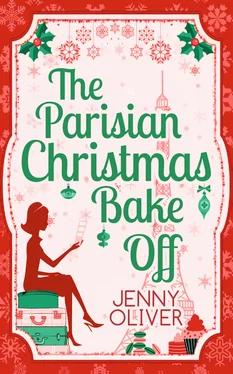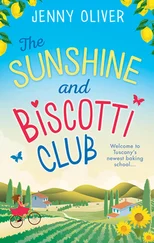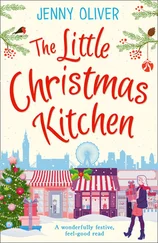Rachel had a sudden urge to ask Jackie to text her a photo of it, but stopped mid-message, not wanting her to think she was a pathetic, needy idiot.
Instead the alarm on her phone went off to tell her the dough was ready. In the past she would have plaited plump strands into individual little loaves but this time she just wanted it out of sight and hurled it into the oven, like a hot potato, where it sat off-centre on the baking tray.
There was a knock on the door as she was still staring into the oven trying to work out how there was bread baking in there after so many years of her steering well clear. Surprised, she ran over, oven gloves still on, and pulled it open.
Madame Charles’s housekeeper was standing on the landing, a big basket clutched in front of her paisley-patterned housecoat.
‘Bonsoir, Mademoiselle.’
‘Bonsoir — ’ Rachel paused.
‘Chantal.’
‘Bonsoir, Chantal.’
There was silence. Rachel leant by the door unsure whether to invite her in or if she was just about to be told that she’d done something wrong. She wondered whether she should tell Chantal now that she was leaving tomorrow.
‘I bring you some things.’ Chantal held up the basket, then peered round Rachel into the flat. ‘For your room.’
‘Oh.’ Rachel didn’t know what to say. ‘I think I have everything I need. Actually I’m leav—’
Chantal cut her off. ‘Things to make it —je ne sais pas —happy?’
‘Happy?’ Rachel looked down at the bag as Chantal squeezed past her and put it down on the table.
As Rachel closed the door Chantal pulled out two red cushions, a little frayed around the edges, and went and rested them on the sofa, plumping them up with both hands and then pulling the corners straight so they sat beautifully, as they might have once done in Madame Charles’s flat. Coming back to her bag, she took out a strip of thick aquamarine wool and, shaking it out, draped it over the ratty armchair in the corner, tucking it in neatly around the edges of the cushioned seat. Then she stood back, arms pointing to the objects, as if highlighting to Rachel what she was trying to do.
‘Happy,’ she said again.
Slightly perplexed, Rachel watched her go back to her Mary Poppins basket and pull out a mirror with pink china flowers across the top. Pointing to a chip, Chantal rolled her eyes and said, ‘That Madame Charles throws away.’
Next came a spider plant that she carried through the alcove and sat on the window sill alongside a tiny snow-globe of the Eiffel Tower; this she shook and held out to Rachel.
‘I buy this for you.’
Crossing the room, Rachel picked the ball of plastic out of Chantal’s hands, lost for words. When she shook it she noticed her hands were shaking as she watched the snow fall gently round the spire—twisting and swirling round the miniature statue.
‘You shouldn’t have,’ Rachel said, transfixed by the globe and the kindness of the gesture.
Chantal shrugged. ‘I think of you up here alone in this—’ she glanced around ‘—this place and I think that it is not comfortable, especially at Christmas. My daughter, she is about your age and if she was here I would want someone to make her comfortable.’ Chantal folded her arms across her chest.
‘Does she live in Paris?’ Rachel asked, turning the globe upside down again and watching the flakes tumble past the spire of the tower.
‘Oh, no.’ Chantal shook her head. ‘She is in the South. In Nice.’
Rachel looked up. ‘I love Nice. I went on holiday there a couple of years ago. Such a beautiful city. How lovely that you can go and visit her there.’
Chantal seemed to hug her arms a little closer round her chest. ‘I have not been.’
‘Oh,’ said Rachel. ‘She comes to see you?’ she asked and then kicked herself when she realised she’d missed the tension in the comment and should have just changed the subject.
‘Non.’ Chantal turned to look around the room, and then with a forced casualness said, ‘We do not speak any longer.’
‘I’m sorry.’
She waved a hand as if it were nothing. ‘She has a strong will.’
Rachel nodded, immediately curious as to what had happened.
‘Anyway, I think of her when I think of you up here, and I would want her to be comfortable.’ The oven timer pinged and Chantal, taking it as a cue to change the subject, wandered over, peered in through the oven door and, smelling the freshly baked bread in the air, she sighed.
Rachel went to place the plastic snow dome on the shelf but changed her mind and kept hold of it as she glanced at Chantal, who seemed suddenly smaller and more alone than she had done when she’d first come in. ‘Would you like some bread?’ Rachel asked.
‘Oh.’ Chantal rested her hands across her waist and stood as if this were what she’d been waiting for all along. ‘If it is not an intrusion.’
Rachel shook her head. If anything it was something of a relief to have someone there with her and Chantal appeared to feel the same way.
A few minutes later the housekeeper was sitting at the table with a cup of tea, smiling through a mouthful of warm, soft bread. ‘C’est très bon. Parfait.’ Tearing off another piece, she said, ‘You make very good bread.’
‘Thanks.’ Rachel hadn’t touched hers; she was somewhere else entirely, overwhelmed by the smell of fresh-baked dough, the sadness in Chantal’s eyes when she talked about her daughter, and distracted by her snow-globe and the red cushions.
‘Yes. It is very good. Très bon. Like the boulangerie at the end of the road.’
Rachel thought again about what her mum would say if she told her she was going to quit the contest: One more chance. For me.
‘You compete, oui ? For the bread? That is the competition.’
‘Pretty much. With Henri Salernes.’
‘ Oh la la , Henri Salernes. Very grand. Whatever happened to him? I had his book. Very good, a very clever man. And his brother, yes? The two of them, they had a lot of skill. And their restaurant, it was very famous. And now nothing except the pâtisserie, oui ? Just a little pâtisserie that no one would know belonged to him. Very sad. Trying to prove too much too young, I think. That is what the papers say if I remember, grew up badly—not a good home, you understand?’
‘I don’t really know that much about the restaurant. Just that he was an amazing baker once.’
‘ Oui , once. He was the youngest and the most celebrated. He changed the way we bake. And his brother, he change the way we cook. One was the savoury and one the sweet … Then it all goes, pouf, like that. All the money for Henri on the drink and the drugs, I think. It is always on the drink and the drugs. Silly man. He had a lot of talent. But …’ she held her arms out wide ‘… c’est la vie. ’ She popped the rest of her slice of bread in her mouth. ‘Well, if I was the judge, you will win already. You do very well.’
Rachel reached forward and tore a little chunk off the loaf and popped it in her mouth. The power of the taste almost made her crumple on the spot. Soft and warm like a blanket.
One more chance. For me.
‘Very well. Very good bread.’
For me?
OK, Mum. She nearly said it out loud, nodding and holding tight to the globe.
‘You find it better? Yes?’ said Chantal, following her gaze from the snow-globe to the rest of the room.
‘Yes. Thank you,’ Rachel replied. ‘I find it much better.’
Next morning Rachel arrived at the pâtisserie with all the embroidered flowers that he’d made such a fuss about snipped off her apron, determined to prove to Chef Henri he was wrong about her.
Читать дальше












